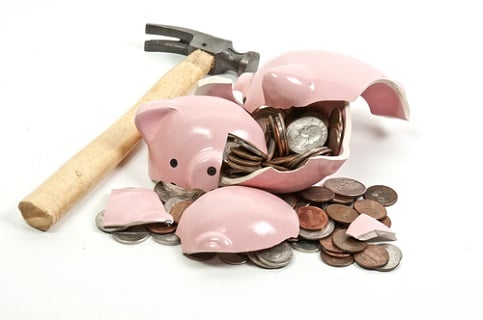Maybe you went overboard with Christmas presents. Perhaps you visited home for the holidays. Maybe New Year's Eve was simply too much fun.
For whatever the reason, all reports say that January is a tough month when it comes to cash in Sweden. So what to do?
Adjusting to life in a new town, meeting new friends and finding your way around both an unknown campus and a confusing curriculum can be bewildering enough, without also having to face the strained economy that student life offers.
Here's your survival guide to having fun on a tight budget.
Coffee:

Giving up that twice-daily frappa-latte-cino can be a hard blow for any student, but the price tag on lattes from fancy cafés will eat away your student funds quicker than you can say “extra shot of hazelnut, please".
The best solution to this is bringing a thermos flask to class, but as you aren’t likely to remember to do this, there’s luckily another cup of joe that won’t force you to dip into your savings: student cafés exist within twenty metres of most lecture halls in the country, selling coffee for ten kronor or less.
If you don’t happen to be nearby one of these, Pressbyrån and7-Eleven are also happy to provide some of the most economical offerings in town, and usually have cards so that loyal customers can get a coffee free after purchasing several.
Sure, their watery brew may not be the same taste sensation you'll find at high-class city cafés, but it’ll do the trick to keep the caffeine levels in your blood constant, and keep you purring alertly throughout all your most boring lectures.
Partying:

After a rough week spent ploughing through books in the library, you could be excused for wanting to let off some steam and go out for a drink and perhaps a bit of a dance.
Unfortunately, Sweden’s high alcohol prices and expensive cover charges at trendy night clubs may make this a difficult venture.
The obvious solution is to stick to student pubs, of which universities usually have plenty to offer. There’s more than one for every night of the week, selling thirsty students beer at less than half the price of other spots in town.
Besides, visiting your nearest student watering hole is a great way to meet new like-minded friends and fellow students.
Food:

Food is a major cost that is difficult to avoid altogether, but it can be whittled down.
Tried-and-true tips for students with limited resources, energy and kitchen space include classics such as living on a diet of ramen noodles and macaroni, as well as the more inventive suggestion of frying your fish sticks in the toaster.
But if your culinary expectations aim a wee bit higher, don’t despair! There may be cost cuts to be had all the same.
If your kitchen space allows, get your biggest pot out of the cupboard, buy an armload of Tupperware containers, and get to work making lunch boxes to bring to class for the next term or so. Not eating out for lunch will save tons of money.
As for a dinner option that’s both unbeatably cheap and sociable at the same time, try mooching off the aforementioned student pubs, which often offer a free meal some night of the week, if you show up early enough.
For instance, classic Stockholm University hangout Gula Villan provides hungry and weary students with a steaming bowl of veggie soup every Wednesday. Find out what's going on at your school too!
Transport:

A bicycle is a student's best friend – it's true. And you can always sell it when you move again, so it can definitely be worthwhile.
Find a cheap used bike on eBay style website blocket.se, or go to the police’s auctions, where lost bicycles are sold for next to nothing.
If you aren’t staying in the country for long, buying a bike may seem like an unnecessary investment. Another option for students in larger cities is zipping around on a rented bike from City Bikes. For just 250 kronor you can borrow bikes throughout the city as often as you desire, between April and October.
Otherwise, public transportation is a reasonably cheap way to get around town, and usually there are special student prices. See more details about handy resources and transport here.
Books:

Course literature is a never-ending source of frustration for students old and new. The many required books are often hard to come by, as two hundred course mates race to empty the shelves on the first day of class, and always horridly expensive.
However, there are a number of solutions that’ll save you both the chaos and the costs. The key words to remember are organisation and foresight.
Your local library will have a few copies of the required books, but never enough for the whole class, so to avoid the stampede, get in there early.
Insider tip: it’s often possible to reserve books in advance on library websites.
Other cheap reading options are borrowing from friends and photocopying necessary pages, or buying second hand – keep an eye out for a bulletin board near your lecture halls, where former students try to sell their used books for a low price.
Clothing:

Say goodbye to the high street – from now on, buy all your clothes second hand. Vintage shopping is dirt cheap, lots of fun, and has the added advantage of currently being highly fashionable.
Check out examples of Sweden’s second-hand scene at chain stores Stadsmissionen and Myrorna. The chains exist in most large cities, so look up the nearest one near you.
Besides, maybe your new life as a student can involve a slimmed-down wardrobe? You can always try hosting a clothing swap as well – get together with friends and switch clothes so everyone can find something they like!
Now that your new outfit is assembled, gather all items in your closet that you no longer want, and either give them away to charity or sell them for a tidy profit to be spent at the nearest student pub!
Do you have other tips for managing on a tight budget in Sweden? Comment below!



 Please whitelist us to continue reading.
Please whitelist us to continue reading.